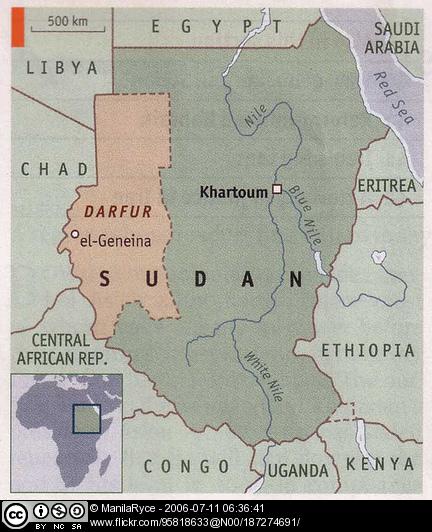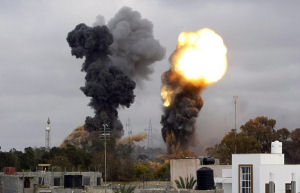How the ICC can help Kenya
The ongoing International Criminal Court trial into the so-called “Ocampo Six” is a reminder of how raw the violence around the 2007 Kenyan election remains. It now seems likely that the verdicts on the six won’t be announced until next year – until which time Uhuru Kenyatta, one of those accused of inciting ethnic violence, remains in the post of Deputy Prime Minister. Over 1100 were killed, and had the coalition agreement not come when it did, the spectre of fully-blown Civil War was a genuine possibility. The international community was in shock, having traditionally viewed Kenya as one of the least violent countries in Africa. Really, they shouldn’t have been. A brief history lesson into how Daniel Arap Moi …
The Fight for Libya’s Oil
While the remaining forces loyal to Muammar Gaddafi still hold out against the rebel militia and its NATO allies in the coastal town of Sirte, the fight for Libya’s oil has already begun. Europe’s oil companies are hovering like a flock of carrion birds over the carcass of Gaddafi’s regime. The pickings to be had are significant. Libya accounts for 2% of global oil production, but the development of new fields could see that figure double in the next decade. Proven reserves of 46.4 billion barrels are confirmed, but vast tracts of the Libyan deserts remain unexplored. Europe’s oil giants Eni, Total, BP and Repsol YPF are perfectly positioned to take advantage of these commercial opportunities. Gas production, too, has …

China and India in Sudan: an Uncertain Relationship
On June 21, at the Manor Road Building, Oxford University, Daniel Large and Luke Patey discussed the role of China and India in Sudan’s oil sector. This industry is of particular interest today, as on the 9th of July the country will split into Northern Sudan and Southern Sudan. The recent border clashes illustrate the lack of agreement between the two sides about the sharing of oil revenues. The two speakers situate this issue within an international context by contrasting the involvement of China and India and discussing the long-term prospects of Sudan’s oil industry, among other interesting questions. China’s involvement in Africa has become a hot topic in media and political discussions. This has concealed that of other Asian …

Which Entity is the Government of Libya and Why does it Matter?
In the past couple of days, Germany and Canada have joined the group of countries that have declared that they consider the National Transitional Council (NTC) in to be the “legitimate representative” of the Libyan people. But what exactly does this mean? According to the BBC, the group of countries extending this recognition includes France, the UK, Italy, Spain, Germany, the UAE, Qatar, Jordan, Gambia, Senegal and Australia. Russia and the United States have had meetings with the NTC and have also made similar declarations about the illegitimacy of the Gaddafi regime and about the legitimacy of the NTC (see previous post by Stefan Talmon on the US position in March). What are the legal implications, if any, of these …
Justice and Gadhafi’s Fight to the Death
Everyone wants to see wrongdoers punished. But safe exile for bad rulers is often the least worst option. The violence in the Ivory Coast that has left more than 1,300 dead since last November’s presidential election may soon be coming to an end. Incumbent President Laurent Gbagbo, who refused to cede power after losing in the polls to Alassane Ouattara, is reportedly negotiating the terms of his surrender after a week-long offensive by pro-Ouattara forces. What’s puzzling about how this conflict is ending is why Gbagbo didn’t leave sooner, especially after African Union leaders had offered him immunity several times if he agreed to go into exile in South Africa. With 80% of Ivorian territory taken by pro-Ouattara forces and …
Does SC Resolution 1973 Permit Coalition Military Support for the Libyan Rebels?
In his post of 30/03/11, Marko notes the debate surrounding whether the Coalition now taking military action in Libya can arm the rebels fighting in that country. This question is perhaps part of a broader question of whether the coalition can provide other military aid to the rebels, for example, by providing close air support for rebel advances into towns under the control of Col Gaddafi’s forces. As Marko notes, while the US and UK have both denied that they have made a decision to provide arms to the rebels (see here and here), they have both argued that providing arms to the rebels would not be a breach of the arms embargo imposed by Security Council Resolution 1970. In fact media reports today …
Did the fax machine cause the Tunisian uprising?
Sounds unlikely. Did Twitter? Nobody really seems to claim so, though Evgeny Morozov erroneously claims that Andrew Sullivan claims so, though Sullivan actually only raised the question and linked to Ethan Zuckerman, who … wait, back to the fax machine. I met Marc Plattner yesterday, who edits the Journal of Democracy and is a veteran of both academic and policy discussions around issues of democracy and democratization. He told me about how some people used to claim the fax machine “caused” (or at least played a large part in) the collapse of the Soviet Union. You can imagine all the arguments that could be marshalled. (“Between them, television, the fax machine and word of mouth have banished fear,” writes John …









